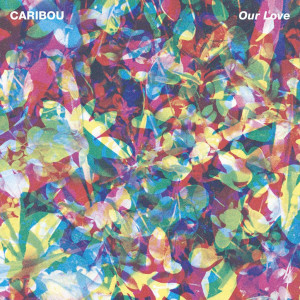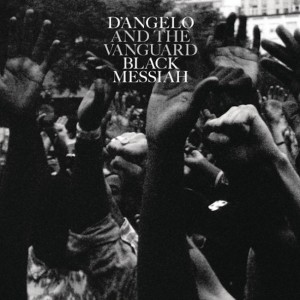The Ten Best Albums of 2014
April 16, 2015
- Sun Kil Moon – Benji [Caldo Verde]
Folk act Sun Kil Moon’s sixth album Benji is singer-songwriter and frontman Mark Kozelek’s depiction of mortality: how he has been surrounded by death, the toll it has taken on his life, and ultimately its inevitability. Kozelek’s writing is unhindered and raw, often entailing every detail of a situation like a campfire story rather than a poetic delivery. The classical guitars are often layered and the strings breath with life. Although these tracks have heart breaking narratives behind them, they don’t inspire solitude or depression. Kozelek sings of his cousin and uncle who both were incinerated in separate aerosol can fires, the murders that have surrounded his life, and how miserably he’ll miss his parents when they pass, but in a way that shows he’s learning from these experiences. His tales are soothing in a way, in the fact they inspire you to live in the moment and take everything as it comes. Benji contradicts its own nature.
- The War On Drugs – Lost In The Dream [Secretly Canadian]
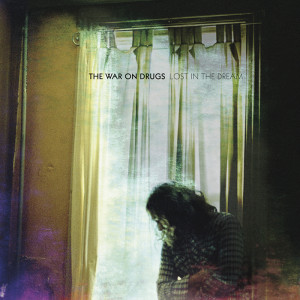
Philadelphia indie rock band The War On Drugs’ third studio album, Lost In The Dream, captures the essence of its title quite well.While drawing influences from a wide range of artists, from Bob Dylan and Bruce Springsteen to Spacemen 3, The War On Drugs have still created a unique and ambitious sound with Lost In The Dream that’s somewhere ambivalently between organic and synthetic. Grandeur synth pads and strings clash with guitars, drum machines clash with acoustic drums, yet all inferior to Adam Granduciel’s singing. The lyrics of Lost In The Dream are concerned mainly with narrating a man’s breakdown, his descent to depression and the big “what now?” that comes from the aftermath. And though plaintive in nature, it takes a quite beautiful form. Not many albums capture the pretty side of the ugly as well as this one.
- clipping. – CLPPNG [Sub Pop]
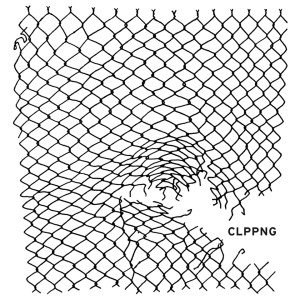
CLPPNG begins with the screech of a feedback tone and rapper Daveed Diggs fitting as many words possible into a minute and five seconds, eventually disintegrating into an unidentifiable noise so distorted it’s nausea-inducing. The intro for the sophomore album by experimental hip hop trio clipping. is an effective presage for the forthcoming hour of cacophony and disorder. Their somewhat-self-titled album is a venture to the far reaches of rap with a style like the deformed offspring of Death Grips and Autechre. The textures are noisy and the blips and synth squeals are excruciatingly overdriven, all making Daveed’s rapping even more intense. Every track tells a unique story and stray from the stereotype of hip hop’s reliance on boasting. In fact, the entire album seems almost devoid of any “I” or “me”, which may explain the absence of I’s in the title. This album feels like clipping. are testing their own limits, and they may be dragging the world of hip hop with them in the process.
Our Love isn’t what you’d normally expect from an album thematically concerned with such a cliche. Electronic musician Dan Snaith’s fourth album as Caribou is often bubbling in its throaty synths and beds of reverb, and he consistently proves his adept compositional skills while still thoroughly repetitive in his house-influenced style. And yet obviously inspired by some aspects of more generic electronic music, the album deviates from attempting to appeal to the masses. Despite its usually synthetic array of instrumentation and repetitive form, Our Love is surprisingly human.
- Eno & Hyde – High Life [Warp]
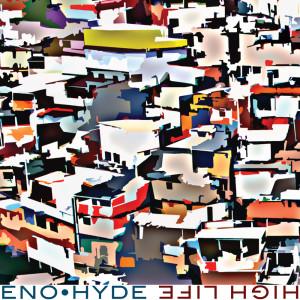
High Life is the second collaborative project by experimental musician Brian Eno and Underworld guitarist Karl Hyde, released only one month after their first, Someday World. The album features warm guitars, droning vocals, and minimal percussion all processed in a range from nominal to unrecognizable. Compositionally, the rhythms are busy, repetitive; two-measure phrases are repeated throughout the majority of the songs. Occasionally a pool of reverb makes its way through the saturated strings or the rhythms stutter and warble. Progression on the album is backhanded and paced at a speed which is mesmerizing yet compelling. This album shows many influences, usually being from the styles of African music, funk, ambient, glitch, reggae, the list goes on. What makes this album incredible is how the two have deconstructed these styles and crafted them into a refined piece of art pop. High Life is an inspired vision of the future of world music.
- Cloud Nothings – Here And Nowhere Else [Carpark]
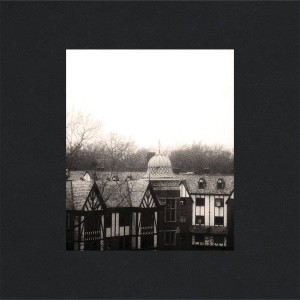
Cloud Nothing’s last album Attack On Memory hinted at a desire to change directions from their older lo-fi garage pop, and right off the bat with their fourth album Here And Nowhere Else it’s apparent that the transformation has been made. Their new ventures are ferocious and briskly pace, incited by anger and letdown. Frontman Dylan Baldi’s knack for writing incredibly catchy riffs that seem to come multiple times per track is still present in the new style. While all incredible tracks that all play their part into Baldi’s depiction of the mind games in the end of a relationship, the closer track I’m Not Part Of Me is the standout on the record, in both his writing skill and acting as a summation of all of the emotions displayed throughout the album. Although it’s rather common in concept, Here And Nowhere Else stands out in B aldi’s temperamental and often chilling writing.
- Flying Lotus – You’re Dead! [Warp]
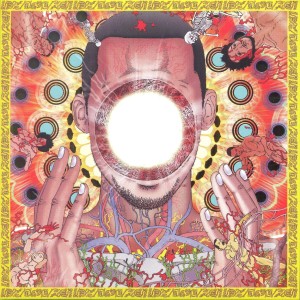
Its title a spoiler in itself: You’re Dead! is electronic musician Steven Ellison’s (aka Flying Lotus’) prophecy of the afterlife. It begins with crack of a bell giving way to heavenly bed of voices and strings all moving around in a culmination of suspense, and Ellison has made it clear less than a minute into the album. You’re dead. The next 38 minutes are the soundtrack of someone coming face to face with the biggest fear of humanity, accompanied by anxious jazz beats, frequent collaborator Stephen Bruner’s fleet basslines, and an amplitude of stirring keys and synths. Although it encompasses the expanse of the death, the album isn’t depressing as one might imagine. It’s driven by electrified rhythms and spellbinding samples, and the abrasive textures enclose the listener in a wall of tension. It doesn’t dwell on tragedy, rather it travels with it and accepts the perpetuity of life after death, as Niki Randa states repeatedly throughout the last few minutes – “We will live on forever.”
- Mac Demarco – Salad Days [Captured Tracks]
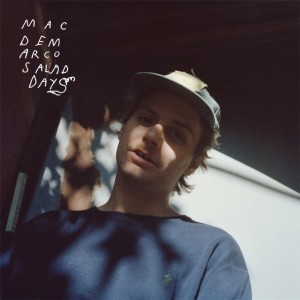
Over the past few years, guitarist and singer Mac Demarco has certainly proved that he has an ear for writing riffs, from the low-pitched brooding manner of Rock And Roll Nightclub to his more refined cigarette serenades and various love songs on 2. What’s surprising about Salad Days is its sense of self-awareness, as if Demarco is acknowledging the silly-guy persona the past two albums have associated him with. The album is more reflective, questioning whether he’d be more fit livin g or just dreaming or addressing the fact that he’s just watching his life fall from his grip. Even though it does prove more thoughtful, Salad Days still retains Demarco’s signature pers onality. The hooks and overall writing are no less than that on 2, and in fact many of these songs seem better adjusted. It’s as if he’s showing his weak spots to his audience without showing any at the same time; he’s documenting his heyday but at this rate he may be far from it.
- Freddie Gibbs & Madlib – Piñata [Madlib Invazion]
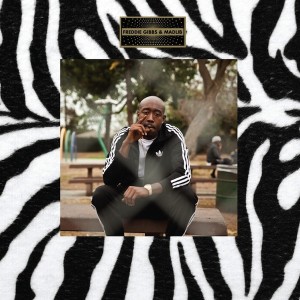
It was in the works for five years, but Piñata is really t he product of thirty two years of struggling and life in the bad part of town. Indiana rapper Freddie Gibbs and legendary producer Madlib’s new collaborative album is like a sepia-toned flashback on Gibbs’ past. He shows what has shaped him and what he’s ashamed of, all in incredibly dense verses that only rappers with the caliber of Gibbs can throw out repeatedly for an entire hour. Madlib’s production has the finesse to match the nostalgic theme displayed on the album, with 90s-esque soul samples that warble in speed like a dysfunctional record and all elements swirling in an almost psychedelic mixture. On both sides, the duo displays the finesse and craft something beyond a display of materialism and egotistical showmanship. Gibbs and Madlib aren’t just assuming that they deserve your attention, they’re proving that they do.
It’s hard to describe an album that proves itself to be so masterful. For example, how can it be ‘retro’ if it’s the future? Similarly, how can it be the future if it’s following the path of classics? D’Angelo has seemingly broken both of these paradoxes with his new album. On Black Messiah, his first solo record in 14 years, he depicts a generation pressured by so many evils, while simultaneously protesting those evils. Stylistically, the new album is incredibly smooth. Its vast dynamism makes headway for the usual laid back grooves and smooth instrumentation all placed under fantastic vocal work. D’Angelo’s willingness to experiment within the conventions of R&B makes Black Messiah a self-contradicting album, in that it breaks all boundaries while comfortable within them.


